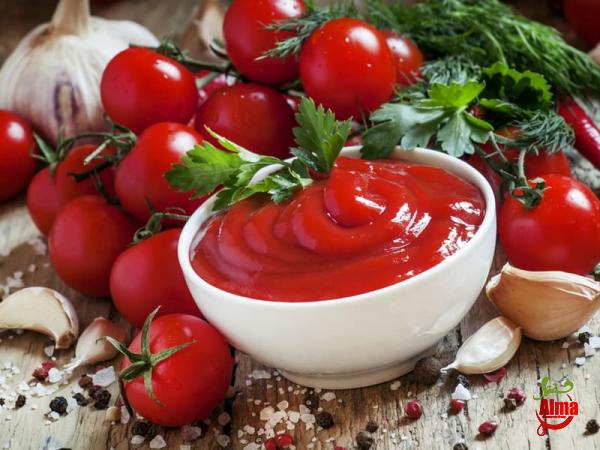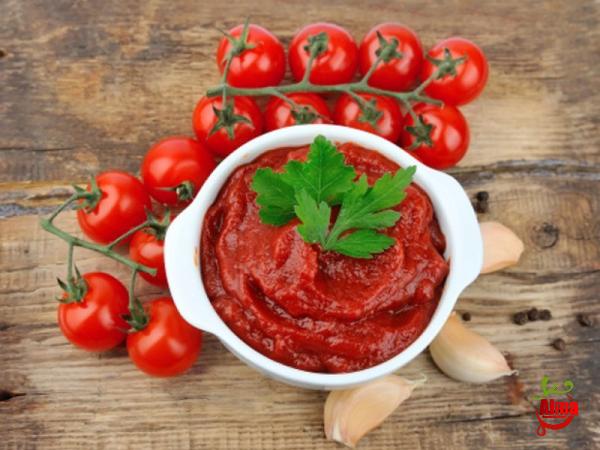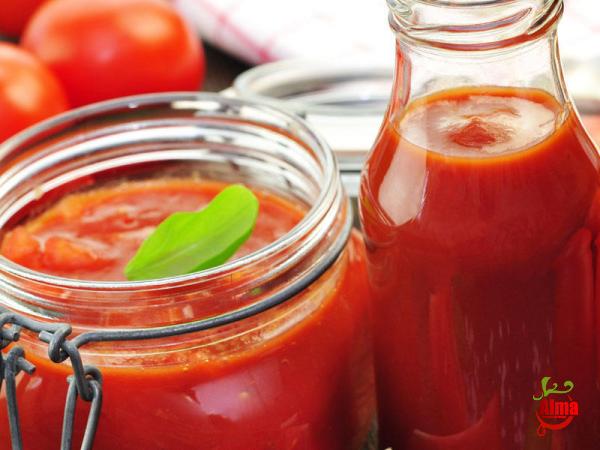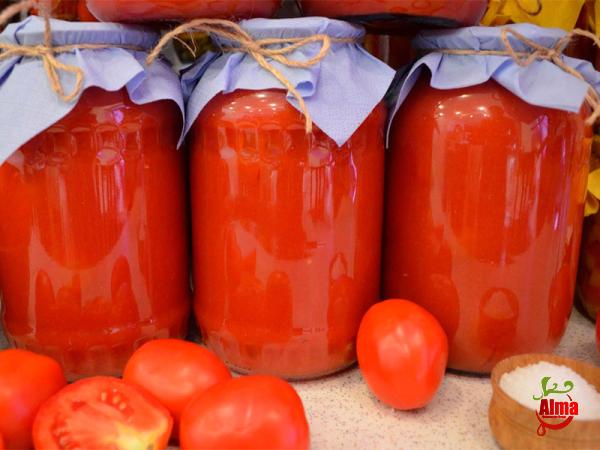The Rise of Organic Tomato Sauce Cans: A Healthy and Sustainable Alternative Introduction The demand for organic food products has been on the rise due to increasing consumer awareness about the health and environmental benefits they offer. One such product that has gained popularity is organic tomato sauce, which offers a healthier and more sustainable alternative to traditional canned tomato sauce. In this article, we will explore the rise of organic tomato sauce cans, highlighting their features, benefits, and the market trends driving their growth. 1. What is Organic Tomato Sauce? Organic tomato sauce is made from organically grown tomatoes that are cultivated without the use of synthetic pesticides or fertilizers. It is typically free from artificial preservatives, colors, and flavors, making it a more desirable option for health-conscious consumers. The organic farming practices used to grow these tomatoes also contribute to the preservation of soil health and the reduction of toxic chemical runoff. 2. Features and Benefits of Organic Tomato Sauce Cans a. Health Benefits: Organic tomato sauce cans provide a healthier option for consumers as they are devoid of harmful chemicals typically present in conventionally grown tomatoes. These cans contain tomatoes that are naturally high in vitamins A and C, antioxidants, and lycopene. The absence of synthetic pesticides and herbicides also makes organic tomato sauce cans suitable for individuals with sensitivities or allergies. b. Sustainability: Organic tomato sauce cans aim to minimize their environmental footprint. The tomatoes used in production are grown using practices that prioritize conservation of soil health and biodiversity. Additionally, the cans are often BPA-free, ensuring that harmful chemicals are not leached into the tomato sauce or released into the environment during disposal. c. Flavor and Quality: Organic tomato sauce cans are known for their superior taste and quality. The tomatoes are carefully selected and processed to preserve their natural flavors, resulting in a rich, tangy, and authentic tomato taste. This attention to detail sets organic tomato sauce cans apart from their conventional counterparts. d. Versatility: Organic tomato sauce cans can be used in a variety of dishes, including pasta sauces, soups, stews, and marinades. They serve as a versatile base that elevates the flavors of various recipes, accommodating different dietary preferences and cultural cuisines.

tomato paste
 3. Market Trends and Growth Drivers a. Increasing Consumer Demand: The organic food market has witnessed significant growth over the past decade, driven by consumers seeking healthier food choices. With the rise of health-consciousness and a growing interest in sustainable practices, organic tomato sauce cans have gained traction among consumers looking for healthier and eco-friendly alternatives to traditional options. b. Retail and E-commerce Expansion: Organic tomato sauce cans are now more accessible than ever, both in physical retail stores and through online platforms. The expansion of organic food sections, dedicated health food stores, and online marketplaces has made it easier for consumers to find and purchase these products, contributing to their increased popularity. c. Influence of Social Media and Food Movements: The influence of social media platforms and various food movements, such as farm-to-table and sustainable eating, has amplified the demand for organic food products, including organic tomato sauce cans. Recipes, cooking tips, and endorsements from food bloggers and influencers have showcased the versatility and benefits of organic tomato sauce, prompting consumers to explore this healthier option. 4. Challenges and Future Outlook a. Higher Price Point: Organic tomato sauce cans often come with a higher price tag compared to conventional options. The use of organic farming practices, adherence to strict certification standards, and limited availability of organic tomatoes contribute to the increased cost. However, as the demand for organic products continues to grow, economies of scale and increased competition may lead to more affordable options in the future. b. Supply Chain Management: The production of organic tomato sauce cans relies heavily on the availability of high-quality organic tomatoes. Ensuring a reliable supply chain that can meet the growing demand can be challenging for manufacturers. Collaborations with organic farmers, investment in organic agriculture infrastructure, and adoption of sustainable farming practices can help address this challenge.
3. Market Trends and Growth Drivers a. Increasing Consumer Demand: The organic food market has witnessed significant growth over the past decade, driven by consumers seeking healthier food choices. With the rise of health-consciousness and a growing interest in sustainable practices, organic tomato sauce cans have gained traction among consumers looking for healthier and eco-friendly alternatives to traditional options. b. Retail and E-commerce Expansion: Organic tomato sauce cans are now more accessible than ever, both in physical retail stores and through online platforms. The expansion of organic food sections, dedicated health food stores, and online marketplaces has made it easier for consumers to find and purchase these products, contributing to their increased popularity. c. Influence of Social Media and Food Movements: The influence of social media platforms and various food movements, such as farm-to-table and sustainable eating, has amplified the demand for organic food products, including organic tomato sauce cans. Recipes, cooking tips, and endorsements from food bloggers and influencers have showcased the versatility and benefits of organic tomato sauce, prompting consumers to explore this healthier option. 4. Challenges and Future Outlook a. Higher Price Point: Organic tomato sauce cans often come with a higher price tag compared to conventional options. The use of organic farming practices, adherence to strict certification standards, and limited availability of organic tomatoes contribute to the increased cost. However, as the demand for organic products continues to grow, economies of scale and increased competition may lead to more affordable options in the future. b. Supply Chain Management: The production of organic tomato sauce cans relies heavily on the availability of high-quality organic tomatoes. Ensuring a reliable supply chain that can meet the growing demand can be challenging for manufacturers. Collaborations with organic farmers, investment in organic agriculture infrastructure, and adoption of sustainable farming practices can help address this challenge.
Specifications of tomato paste
 c. Potential for Innovation: The growing popularity of organic tomato sauce cans presents opportunities for innovation in packaging, flavors, and production techniques. Manufacturers may explore options such as compostable packaging, new flavor combinations, and sustainable packaging materials to further enhance the appeal and sustainability of their products. Conclusion Organic tomato sauce cans have emerged as a preferred choice among health-conscious and environmentally conscious consumers. With their numerous health benefits, commitment to sustainability, and superior flavor profiles, organic tomato sauce cans offer a compelling alternative to traditional canned tomato sauce. As consumer demand and awareness continue to grow, the market for organic tomato sauce cans is expected to thrive, offering a healthier and more sustainable option for consumers worldwide.The Rise of Organic Tomato Sauce Cans: A Healthy and Sustainable Alternative Introduction The demand for organic food products has been on the rise due to increasing consumer awareness about the health and environmental benefits they offer. One such product that has gained popularity is organic tomato sauce, which offers a healthier and more sustainable alternative to traditional canned tomato sauce. In this article, we will explore the rise of organic tomato sauce cans, highlighting their features, benefits, and the market trends driving their growth. 1. Growing Consumer Preference for Organic Food Products In recent years, there has been a noticeable shift in consumer preferences towards organic food products. Health-conscious individuals are increasingly seeking out organic options that are free from harmful chemicals, pesticides, and synthetic additives. Organic tomato sauce cans offer a convenient way for consumers to incorporate this healthier alternative into their everyday cooking and meal preparations. 2. Health Benefits of Organic Tomato Sauce Cans Organic tomato sauce cans provide a range of health benefits that make them an attractive choice for consumers. Firstly, they contain higher nutrient levels compared to conventionally grown tomatoes. Organically cultivated tomatoes tend to have higher concentrations of vitamins A and C, as well as antioxidants and lycopene, which are known for their potential health benefits, including anti-inflammatory and cancer-fighting properties. Furthermore, organic tomato sauce cans are free from synthetic pesticides and herbicides, making them a safer option for individuals with sensitivities or allergies. People who are focused on maintaining a wholesome and balanced diet can enjoy peace of mind knowing that they are consuming a product that is devoid of potentially harmful chemicals.
c. Potential for Innovation: The growing popularity of organic tomato sauce cans presents opportunities for innovation in packaging, flavors, and production techniques. Manufacturers may explore options such as compostable packaging, new flavor combinations, and sustainable packaging materials to further enhance the appeal and sustainability of their products. Conclusion Organic tomato sauce cans have emerged as a preferred choice among health-conscious and environmentally conscious consumers. With their numerous health benefits, commitment to sustainability, and superior flavor profiles, organic tomato sauce cans offer a compelling alternative to traditional canned tomato sauce. As consumer demand and awareness continue to grow, the market for organic tomato sauce cans is expected to thrive, offering a healthier and more sustainable option for consumers worldwide.The Rise of Organic Tomato Sauce Cans: A Healthy and Sustainable Alternative Introduction The demand for organic food products has been on the rise due to increasing consumer awareness about the health and environmental benefits they offer. One such product that has gained popularity is organic tomato sauce, which offers a healthier and more sustainable alternative to traditional canned tomato sauce. In this article, we will explore the rise of organic tomato sauce cans, highlighting their features, benefits, and the market trends driving their growth. 1. Growing Consumer Preference for Organic Food Products In recent years, there has been a noticeable shift in consumer preferences towards organic food products. Health-conscious individuals are increasingly seeking out organic options that are free from harmful chemicals, pesticides, and synthetic additives. Organic tomato sauce cans offer a convenient way for consumers to incorporate this healthier alternative into their everyday cooking and meal preparations. 2. Health Benefits of Organic Tomato Sauce Cans Organic tomato sauce cans provide a range of health benefits that make them an attractive choice for consumers. Firstly, they contain higher nutrient levels compared to conventionally grown tomatoes. Organically cultivated tomatoes tend to have higher concentrations of vitamins A and C, as well as antioxidants and lycopene, which are known for their potential health benefits, including anti-inflammatory and cancer-fighting properties. Furthermore, organic tomato sauce cans are free from synthetic pesticides and herbicides, making them a safer option for individuals with sensitivities or allergies. People who are focused on maintaining a wholesome and balanced diet can enjoy peace of mind knowing that they are consuming a product that is devoid of potentially harmful chemicals.
buy tomato paste
 3. Environmental Sustainability as a Driving Force In addition to health considerations, environmental sustainability has played a significant role in the increased popularity of organic tomato sauce cans. The organic farming practices used to cultivate tomatoes for this product prioritize soil health, biodiversity, and the reduction of chemical runoff into water sources. These practices support long-term environmental sustainability, making organic tomato sauce cans a more environmentally friendly choice compared to conventionally produced options. 4. Flavor and Quality Differentiation Organic tomato sauce cans are distinguishable from their conventional counterparts due to their superior flavor and quality. The tomatoes used in these products are carefully selected based on their taste and texture, ensuring a rich and authentic tomato flavor. The absence of synthetic additives also allows the natural flavors of the tomatoes to shine through, enhancing the overall taste and elevating dishes that incorporate the sauce. 5. Versatility and Culinary Application Organic tomato sauce cans offer versatility in the kitchen, as they can be used in a wide range of culinary applications. Aside from being a staple in pasta sauces, organic tomato sauce cans are a useful ingredient in soups, stews, marinades, and even as a base for homemade pizza sauce. This versatility appeals to consumers who wish to incorporate healthier options into their diverse cooking routines. 6. Increased Accessibility through Retail and E-commerce Expansion Organic tomato sauce cans have become more accessible to consumers in recent years, with an expansion of physical retail stores, dedicated health food stores, and online marketplaces. Many grocery stores now have separate sections dedicated to organic food, making it easier for consumers to identify and purchase organic tomato sauce cans. Additionally, the growth of e-commerce platforms has made these products available to a wider audience, allowing for convenient home delivery and greater consumer choice. 7. Social Media and Food Movement Influence The rise of social media platforms, along with various food movements and wellness trends, has contributed to the increased popularity of organic tomato sauce cans. Platforms such as Instagram and YouTube have allowed food bloggers, influencers, and health enthusiasts to share their recipes and cooking tips, showcasing the versatility and benefits of organic tomato sauce. This exposure has influenced consumers to explore healthier cooking alternatives and experiment with incorporating organic tomato sauce into their meals. 8. Pricing Considerations One of the challenges associated with organic tomato sauce cans is their higher price point compared to conventional options. Organic farming practices, strict certification standards, and the limited availability of organic tomatoes contribute to the increased cost. However, as the demand for organic products continues to grow, economies of scale and increased competition may lead to more affordable options in the future. 9. Supply Chain Management The production of organic tomato sauce cans relies on the availability of high-quality organic tomatoes. Maintaining a reliable supply chain that can meet the growing demand can be challenging for manufacturers. Collaborations with organic farmers, investment in organic agriculture infrastructure, and the adoption of sustainable farming practices can help ensure a consistent supply of organic tomatoes for production. 10. Potential for Innovation and Future Outlook The growing popularity of organic tomato sauce cans presents opportunities for innovation in packaging, flavors, and production techniques. Manufacturers may explore options such as compostable packaging materials, new flavor combinations, and sustainable packaging designs to further enhance the appeal and sustainability of their products. As consumer demand and awareness of the benefits of organic food continue to increase, the market for organic tomato sauce cans is expected to expand, offering a healthier and more sustainable option for consumers worldwide. Conclusion Organic tomato sauce cans have emerged as a preferred choice among health-conscious and environmentally conscious consumers. With their numerous health benefits, commitment to sustainability, and superior flavor profiles, organic tomato sauce cans offer a compelling alternative to traditional canned tomato sauce. As consumer demand and awareness continue to grow, the market for organic tomato sauce cans is expected to thrive, providing a healthier and more sustainable option for consumers worldwide.
3. Environmental Sustainability as a Driving Force In addition to health considerations, environmental sustainability has played a significant role in the increased popularity of organic tomato sauce cans. The organic farming practices used to cultivate tomatoes for this product prioritize soil health, biodiversity, and the reduction of chemical runoff into water sources. These practices support long-term environmental sustainability, making organic tomato sauce cans a more environmentally friendly choice compared to conventionally produced options. 4. Flavor and Quality Differentiation Organic tomato sauce cans are distinguishable from their conventional counterparts due to their superior flavor and quality. The tomatoes used in these products are carefully selected based on their taste and texture, ensuring a rich and authentic tomato flavor. The absence of synthetic additives also allows the natural flavors of the tomatoes to shine through, enhancing the overall taste and elevating dishes that incorporate the sauce. 5. Versatility and Culinary Application Organic tomato sauce cans offer versatility in the kitchen, as they can be used in a wide range of culinary applications. Aside from being a staple in pasta sauces, organic tomato sauce cans are a useful ingredient in soups, stews, marinades, and even as a base for homemade pizza sauce. This versatility appeals to consumers who wish to incorporate healthier options into their diverse cooking routines. 6. Increased Accessibility through Retail and E-commerce Expansion Organic tomato sauce cans have become more accessible to consumers in recent years, with an expansion of physical retail stores, dedicated health food stores, and online marketplaces. Many grocery stores now have separate sections dedicated to organic food, making it easier for consumers to identify and purchase organic tomato sauce cans. Additionally, the growth of e-commerce platforms has made these products available to a wider audience, allowing for convenient home delivery and greater consumer choice. 7. Social Media and Food Movement Influence The rise of social media platforms, along with various food movements and wellness trends, has contributed to the increased popularity of organic tomato sauce cans. Platforms such as Instagram and YouTube have allowed food bloggers, influencers, and health enthusiasts to share their recipes and cooking tips, showcasing the versatility and benefits of organic tomato sauce. This exposure has influenced consumers to explore healthier cooking alternatives and experiment with incorporating organic tomato sauce into their meals. 8. Pricing Considerations One of the challenges associated with organic tomato sauce cans is their higher price point compared to conventional options. Organic farming practices, strict certification standards, and the limited availability of organic tomatoes contribute to the increased cost. However, as the demand for organic products continues to grow, economies of scale and increased competition may lead to more affordable options in the future. 9. Supply Chain Management The production of organic tomato sauce cans relies on the availability of high-quality organic tomatoes. Maintaining a reliable supply chain that can meet the growing demand can be challenging for manufacturers. Collaborations with organic farmers, investment in organic agriculture infrastructure, and the adoption of sustainable farming practices can help ensure a consistent supply of organic tomatoes for production. 10. Potential for Innovation and Future Outlook The growing popularity of organic tomato sauce cans presents opportunities for innovation in packaging, flavors, and production techniques. Manufacturers may explore options such as compostable packaging materials, new flavor combinations, and sustainable packaging designs to further enhance the appeal and sustainability of their products. As consumer demand and awareness of the benefits of organic food continue to increase, the market for organic tomato sauce cans is expected to expand, offering a healthier and more sustainable option for consumers worldwide. Conclusion Organic tomato sauce cans have emerged as a preferred choice among health-conscious and environmentally conscious consumers. With their numerous health benefits, commitment to sustainability, and superior flavor profiles, organic tomato sauce cans offer a compelling alternative to traditional canned tomato sauce. As consumer demand and awareness continue to grow, the market for organic tomato sauce cans is expected to thrive, providing a healthier and more sustainable option for consumers worldwide.









Your comment submitted.